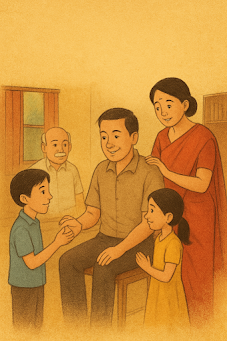
Raghav was the kind of man you would hardly notice in a crowd. He lived in Lucknow with his wife Sunita, two children, and his aging parents. His life was not filled with excitement or adventure; instead, it was woven with small acts of responsibility, sacrifice, and love.
Every morning, he left home before sunrise, catching the bus to his office. His children only saw the shadow of him leaving, not the tiredness in his eyes. His salary was modest, but he stretched it to cover school fees, medicines, loan installments, and daily needs. For himself, he bought nothing—his shoes were worn out, his phone screen was cracked, but if his son wanted a cricket bat or his daughter wanted a dress for a school play, Raghav found a way.
Sunita often scolded him. “You don’t eat properly, you don’t rest, and you never buy anything for yourself. Life isn’t only about duty.”
Raghav only smiled. “When the family smiles, my hunger disappears. Isn’t that enough?”
Once, his son Aarav was selected for a district cricket match. The coach insisted he must buy a proper kit. It cost more than Raghav’s pocket could handle. That evening, he quietly went to a jeweler with his only gold ring, the one Sunita had given him on their wedding day. He sold it, bought the kit, and handed it to his son with a grin. Aarav hugged him tightly, unaware of the sacrifice. Sunita noticed the missing ring but said nothing. She only held his hand with tears in her eyes.
Life moved on until one day, Raghav fainted at the office. The doctor said he was exhausted from skipping meals and overworking. Sunita was angry. “You are the pillar of this family, Raghav. If you break, the whole house will fall. Think of yourself too.” For the first time, he realized she was right. Strength was not endless, and love also meant taking care of one’s own health.
A few months later, something unexpected happened. His boss called him in and said, “Sharmaji, you are not loud or ambitious, but you are steady. You keep this office together quietly. I am promoting you.” The extra salary felt like a blessing. That evening, he brought home sweets. His children clapped in delight, and Sunita’s eyes filled with relief.
Sitting by the window that night, Raghav thought about his life. He had not written books or travelled the world, but he had created a story more meaningful than any history—his family’s happiness. Being a family man was not about grand achievements. It was about invisible acts of love: selling a ring for a cricket bat, skipping meals so the children could eat, smiling even when the heart was tired.
Years later, when his children grew up, they told everyone, “Our father was our greatest teacher. He showed us that real heroes don’t wear capes. They wear simple shirts, carry lunchboxes, and hold the family together with love.”
And though his name was never printed in newspapers, Raghav became a quiet legend in the hearts of those who loved him—the silent pillar on which the family stood.
